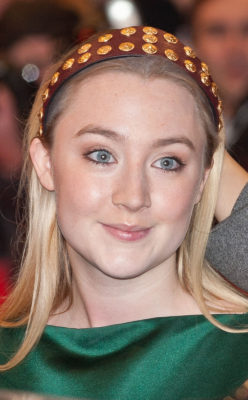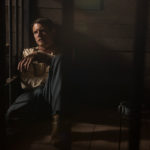
“Lady Bird” glows. There is no other way to describe it.
In indie darling Greta Gerwig’s directorial debut, Saoirse Ronan is the titular Christine “Lady Bird” McPherson, a Catholic-school-plaid-clad spunky teen with a shock of rose-pink hair and an ambition for individuality that knocks the socks off of every coming-of-age lead before her.
Lady Bird — her name that she gave to herself — wants to attend an elite university in the Northeast. Lady Bird wants to live in the turquoise mansion in the wealthy part of town. Lady Bird wants to experience culture, to go anywhere but where she is.
But she doesn’t quite have the grades, nor the funds to go to school on the East coast. Her family lives not in a stately manner but a dated single-level on the other side of the train tracks. And Lady Bird lives, to her dismay, in Sacramento, which she dubs “the Midwest of California.”
Lady Bird, in short, is dissatisfied with her central-Californian, hum-drum life. Ronan, in an astronomically fantastic performance, has her finger on the pulse of the semi-suburban teenager, reading it with startling accuracy.
Any viewer who has ever longed for the big city — for the opportunity to break out and discover a place ripe with opportunity for self-exploration — can relate to Ronan’s Lady Bird.
The performance isn’t one of dissatisfaction so much as yearning, and it is positively captivating to watch. Her spunk and sass and simultaneously caring, wholesome nature are heartwarming and relatable.
There is no sit-com-esque brattiness, no hormonal mood swings, no vengeance or spite. In Ronan’s portrayal, there is only ambition and tenderness and giddy mischief — and more than a few delightfully quirky, rapid-fire quips of dry humor and playful spite.
Yet the performance doesn’t overshadow several other equally notable roles.
Laurie Metcalf, as Lady Bird’s mother Marion McPherson, is extraordinary. Metcalf’s portrayal of an over-worked mother struggling to provide the best for her family is a deeply emotional and overwhelmingly powerful one. Every choice she makes is for the benefit of her two children and her husband — played, tenderly and perfectly, by Tracy Letts.
She is, at times, brash or strict, but it comes from a place of caring selflessness that is unparalleled.
And then there is Julie (Beanie Feldstein), Lady Bird’s dedicated best friend that every high schooler either has or secretly wishes they had. Feldstein’s performance is sweet but never saccharine, and her portrayal of a sidekick best friend elicits compassion, not pity.
As with nearly every coming-of-age narrative, relationships are bound to have falling-outs — and romantic interests are bound to influence them.
But in a feat of Gerwig’s direction and writing, the to-be-expected butting of heads is far from uncomfortable.
Every character is given such attention that their motives are evident and pure — Gerwig skillfully transforms moments of heartbreak and tension into scenes of compassion and empathy, such that one can’t help but fall in love with those at odds.
Instead of taking sides, viewers may find themselves hoping for reunion; no fight is without resolution, and every conflict has a happy ending.
That is not to say the film is idealistic, as, in reality, conflicts take time to settle down. Forgiveness isn’t always sought or granted in the immediate aftermath of an argument.
Even so, leaving loose ends untied makes for more dissatisfaction than enjoyment in a 90-minute film, and the writer-director grasps that. So conflicts are resolved, but they are given time to marinate, too.
Gerwig understands the complexities of human relationships, and she manages to portray them in a way that is deeply empathetic and occasionally tragic — but she also sees the need for a movie that has its happy ending.
The film is steeped in heartache and yearning for something — anything — that lies beyond county lines. But it’s also a love letter to teenager-hood and hometowns and friendship and family that oozes with Gerwig’s trademark charm and an overwhelmingly heartwarming blanket of happiness.
“Lady Bird” is, like the titular character, loveable and compassionate and delightfully mischievous. In a loyal tribute to the pinnacle of teenager-hood, the pastel-tinted portrait of adolescence seeps with warmth and ingenuity unlike anything else on the silver screen today.
The film will fill hearts to the brim with a tender, never-mushy warmth that can only come from seeing aspirations realized and individuality acknowledged.
And for anyone with a soft spot for humanity and an affection for purely wonderful narratives, “Lady Bird” is a must-see.




